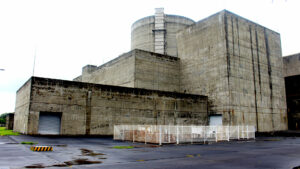
Marcos urged to build expert pool in nuclear energy, ensure safety
By Kenneth Christiane L. Basilio
THE GOVERNMENT of Philippine President Ferdinand R. Marcos, Jr. should build a pool of experts in nuclear technology and ensure its safe implementation if it plans on pursuing it as a vital part of the country’s energy mix, according to economists.
“We need to ensure its safety,” Leonardo A. Lanzona, who teaches economics at the Ateneo de Manila University, said in a Facebook Messenger chat. “It seems more crucial to develop training centers for people who will work in these nuclear plants and study and research centers that can create the necessary expertise to expand its utilization.”
Washington and Manila’s Agreement for Cooperation Concerning Peaceful Uses of Nuclear Energy, also known as the 123 Agreement, entered into force on July 2, the US State Department said in a statement on July 9. Both countries signed the deal in November.
The pact provides a legal framework for the export of nuclear materials, equipment and components from the US to the Philippines.
But Jose Enrique A. Africa, executive director of think tank Ibon Foundation, said nuclear energy could be more expensive than renewable energy and other reliable power sources.
“It’s also doubtful that there is any local expertise or technology that greatly limits our capacity to independently assess and monitor risky foreign nuclear power,” he said in a Viber message.
“The government may be better off pursuing renewable energy systems that are safer and cheaper and where we can still plausibly develop indigenous capacity.”
The 123 Agreement would pave the way for collaboration with US experts to assess the Philippines’ capacity to implement a nuclear energy program, Energy Director Michael O. Sinocruz told BusinessWorld in a Viber message.
In December, Senator Sherwin T. Gatchalian filed Senate Bill No. 2506, which seeks to establish a Philippine Atomic Energy Regulation Commission to oversee the licensing, protection, safety and other operations related to the development of nuclear energy. The measure has yet to be tackled by a Senate committee.
The House of Representatives in November passed on final reading a bill that will establish a similar body called the Philippine Atomic Regulatory Authority, which will have “the sole and exclusive jurisdiction to exercise regulatory control for the peaceful, safe and secure uses of nuclear energy and radiation sources.”
The Energy department last week said an inter-agency committee on nuclear energy is working on a roadmap to implement nuclear energy in power generation.
Energy Undersecretary Rowena Cristina L. Guevarra said the agency plans to hold two green energy auctions before the end of the year, consisting of geothermal, pump-storage hydro and impounding hydro sources.
The Philippines seeks to boost the share of renewable energy in the country’s energy mix from 22% to 35% by 2030 and 50% by 2040.
“The US government’s haste to get a bigger share of the civilian nuclear energy export market should not come at the expense of the Philippines’ national interests,” Mr. Africa said. “Nuclear energy remains risky, and safety demands reliable regulatory and infrastructure frameworks that the country doesn’t have.”



